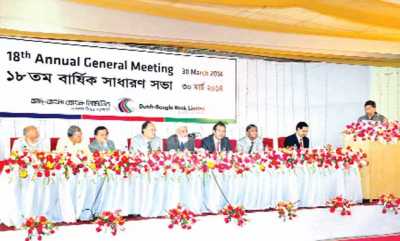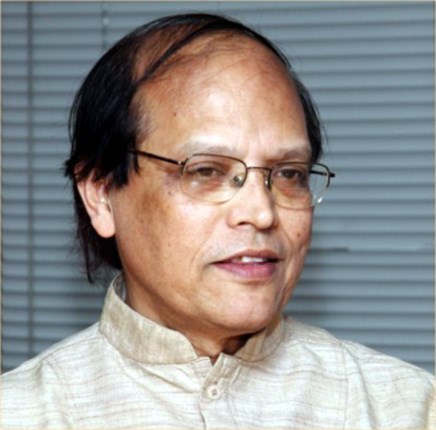Banking
Prime Bank declares 12.5pc dividend

Prime Bank Limited declared 12.5 percent cash dividend for its shareholders for the year 2013.
The announcement, based on the financial statements of the bank, came at the 19th Annual General Meeting of the bank on Sunday.
The AGM was held at the Police Convention Hall at Eskaton Garden Road, Ramna, said a press release.
Md. Nader Khan, Chairman of the Board of Directors of the bank presided over the AGM.
The chairman thanks the shareholders of the bank for achieving the leading position on their continuous support and confidence shown toward it.
Nasim Anwar Hossain and Mafiz Ahmed Bhuiyan, Vice Chairmen, Tanjil Chowdhury, Chairman of the Executive
Committee, Prof. Ainun Nishat, Chairman of the Audit Committee, Imran Khan, Vice Chairman of the
Executive Committee, Md. Shirajul Islam Mollah, M.A. Khaleque, Quazi Sirazul Islam, Khandker Md Khaled,
Md. Shahadat Hossain, Nazma Haque, Salma Huq, Directors and Md. Ehsan Khasru, Managing Director & CEO of the bank were present at the AGM.
Mohammed Ehsan Habib, SEVP and Company Secretary conducted the AGM.
Ahmed Kamal Khan Chowdhury, Quazi A.S.M. Anisul Kabir and Habibur Rahman, Deputy Managing Directors of the bank also attended the AGM.
DBBL declares 40pc cash dividend

Dutch-Bangla Bank Limited (DBBL) declared 40 percent cash dividend for its shareholders and foreign sponsors and shareholders for the year The announcement came at the bank’s 18th Annual General Meeting (AGM) in Dhaka Abedur Rashid Khan, Chairman of the bank, presided over the meeting, said a press release. As per announcement, the local sponsors of the bank will not receive any dividend.
A good number of members participated in the discussion on the overall performance of the bank at the Sayem Ahmed, Chairman of Executive Committee, Md Fakhrul Islam, Dr. Irshad Kamal Khan, Chowdhury Ashraf Hossain, Md Yeasin Ali, Directors of the bank, KS Tabrez, Managing Director, Md Monirul Alam, Company Secretary of the bank attended the AGM. M Sahabuddin Ahmed, Founder of Dutch-Bangla Bank and Chairman of Dutch-Bangla Bank Foundation, was also present at the During the meeting, the financial statement of the bank for the year ended December 31, 2013 was and the members made a critical review of the performance of the bank.
The members expressed their satisfaction with the activities of the bank in the year The shareholders also praised the bank authority for declaring highest cash dividend of 40 percent for 2013 within all listed banking companies.
News:Daily Sun/31-Mar-2014Citi gets Best Bank in Asia award
Citi was named Best Bank in Asia at the annual Triple-A 2013 regional banking awards from The Asset This was the 15th year in a row Citi won the Best Bank in Asia award from the magazine, said a press release.
The bank also picked up the Best Loan House in Asia award. The awards are decided by the editorial team at The Asset “In a highly competitive market, this recognition is greatly appreciated by all of us at Citi. I would also like to thank our clients who place their trust in us to meet their financial needs and without whom this award would not be possible,” said Stephen Bird, Citi’s CEO for Asia Pacific.
“This win demonstrates Citi’s commitment to provide the best solutions to its clients in the Asia Pacific region. This has been possible by focusing on our clients’ requirements and leveraging Citi’s strong network,” said Rashed Maqsood, Managing Director and Citi Country Officer for Bangladesh.
News:Daily Sun/31-Mar-2014
BB governor returns today
 DHAKA : Bangladesh Bank Governor Dr Atiur Rahman will return home today after completing his three Nations The central bank governor left Dhaka for Japan on March 18 at the invitation of the government of Japan reached Tokyo on March 19.
DHAKA : Bangladesh Bank Governor Dr Atiur Rahman will return home today after completing his three Nations The central bank governor left Dhaka for Japan on March 18 at the invitation of the government of Japan reached Tokyo on March 19.
He held meetings with high officials of Bank of Japan and Bank of Tokyo, president of JICA and President of JETRO, officials of Japan-Bangladesh Council for Commercial and Economic Cooperation and Japan Chambers of Commerce and He also had a meeting with President of Japan Mint Yoshiake Atiur visited some business projects and held meetings with From Japan,
Dr Rahman went to Brunei Darussalam to attend the 24th meeting of the IFSB Council, hosted by Autoriti Monetari Brunei Darussalam (It was chaired by the Managing Director, AMBD, Dato Mohd Rosli Sabtu and attended by 10 central governors and heads of regulatory and supervisory authorities, as well as 12 senior representatives among the Council and Full members of the IFSB,
representing 17 He also had a meeting with Bangladesh high commissioner to On his way back home, Dr Raman reached Bangkok today where he spoke on socially responsible for enhancing economic and financial stability at a big gathering of students, teachers and including the President Professor Worsak Nukulchai of Asian Institute of Technology (AIT).
News:Bangladesh Today/30-Mar-2014Weak state banks pose risks to economy: study
The banking sector is seriously vulnerable to economic shocks, mainly due to the poor performance of state-
owned banks, Business Monitor International (BMI), a London-based research firm, found in a recent study.
The state banks have racked up a large amount of non-performing loans on their books, creating a flaw in
the banking system, the study said.
“This makes the banking system extremely vulnerable to shocks and impedes the efficient allocation of
financial resources in the economy,” the BMI said in its Bangladesh Commercial Banking Report 2014.
“Weak balance sheet brings risks to privatisation of state-owned banks.”
As of September 2013, the gross non-performing loan ratio of state banks stood at an elevated 28.8 percent
, an increase from 2011's 11.3 percent and 2012's 23.9 percent, while the speicalised banks' gross NPL ratio remained high at 29.4 percent, it said.
The amount of default loans at the state banks was Tk 16,606 crore or 19.76 percent of their outstanding loans on December 31 last year, according to Bangladesh Bank.
Despite various reforms, the banking sector's health remains poor, and “a greater concerted effort from the regulators, specifically targeted at state-owned banks, is clearly warranted,” the study said.
As of September 2013, capital shortfall at state banks stood at Tk 8,860 crore, and the government has
already disbursed Tk 4,100 crore to strengthen their capital base, the BMI said.
The study also said last year's political unrest marred Bangladesh's image abroad.
A total of 206 fatalities "due to Islamist terrorism" have been recorded up to August last year, which is a
staggering three times more than the total over the past eight years, according to the study.
The report said the total assets of banks are expected to rise by more than 2.5 times to Tk 1,864,280 crore
in 2018, from Tk 708,410 crore in 2012.
Even in the gloomy outlook, some points to cheer remain, it said.
The Financial Action Task Force, an inter-governmental body for monitoring countries that are strategically
deficient in their compliance with its anti-money laundering and counter-terrorism financing rules, has recently removed Bangladesh from its watch list.
“This reflects the significant progress that has been made by Bangladesh to combat money laundering and terrorism financing in its banking system,” it said.
While the central bank has relaxed its loan rescheduling policy to help affected businesses, this temporary
measure is unlikely to provide much reprieve to the continued deterioration in asset quality, the BMI said.
Bangladesh has 56 banks including nine new ones. Four state-owned banks -- Sonali, Janata, Agrani and
Rupali -- hold around a quarter of total industry assets and roughly a fifth of total outstanding loans.
News:The Daily Star/30/Mar/2013


